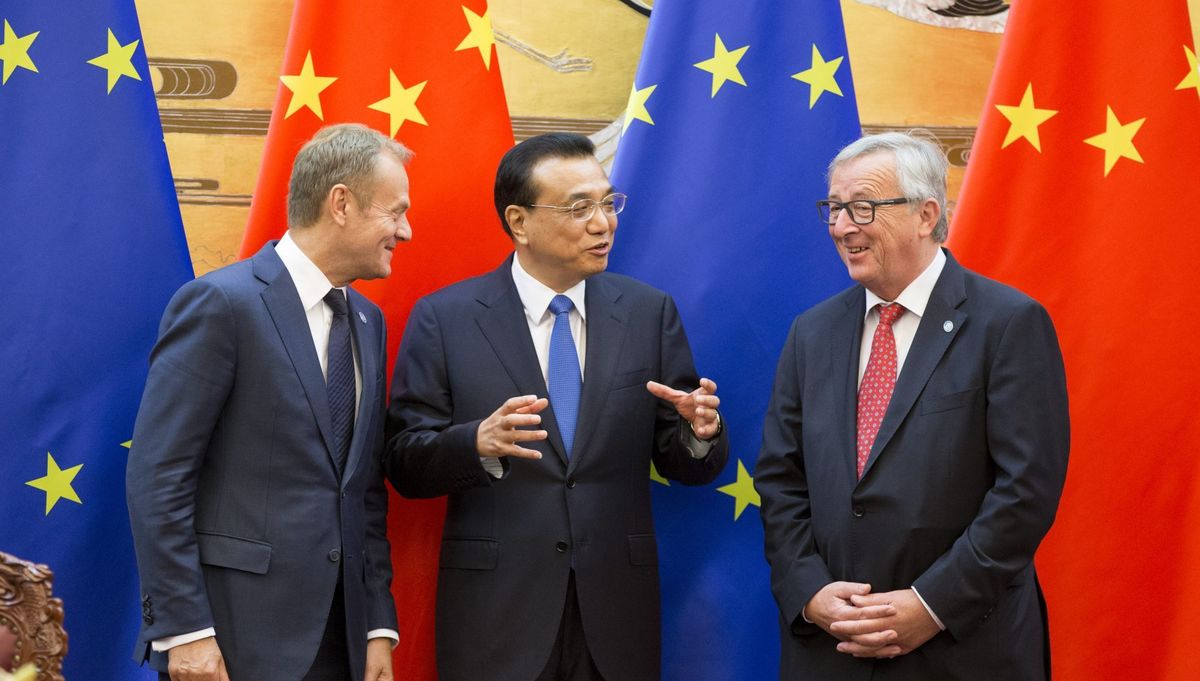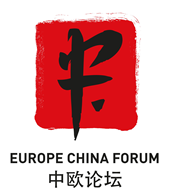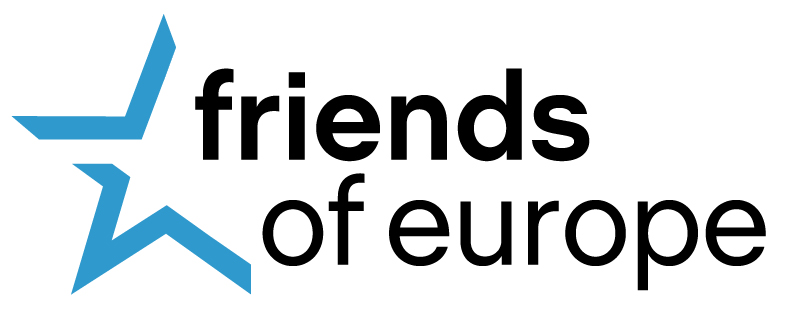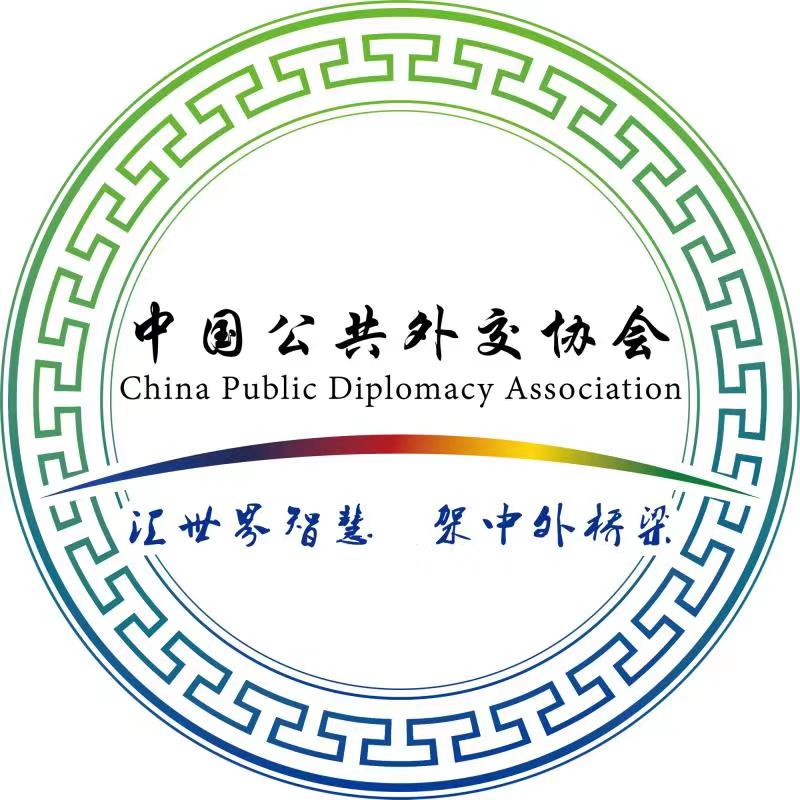
Summary
Despite disagreements, China and EU must pull together to boost trade, global governance
The European Union and China need to press ahead in areas of mutual benefit, such as connectivity and global governance, despite their bilateral disagreements on trade and amid an increasingly fractured global environment, speakers and participants said during heated discussions at Friends of Europe’s ninth Europe-China Forum and Policy & Practice Roundtable on 18-19 November.
Europe and China are already closely linked through trade and politics – and are becoming more so through plans including China’s Belt and Road Initiative and Europe’s own cross-border connectivity plans. But both Brussels and Beijing need to step up their game to reform and re-energise the rules-based multilateral trading system centred on the World Trade Organization (WTO).
“China and the EU are important partners for the international challenges of the times,” said Phil Hogan, European Commissioner-designate for Trade. “We have benefited enormously from the multilateral trading system, but the WTO is facing an existential crisis. The global economy can only continue if we maintain predictability and stability under a global rules-based system.”
China wants to form a free trade agreement with the EU as quickly as possible, but others caution against detracting attention from the Comprehensive Agreement on Investment (CAI) which both parties agreed to conclude in 2020. “We should work together to start negotiations on a free trade agreement, as we talk about an investment agreement,” said Wang Hongjian, chargé d’affaires of the Chinese Mission to the EU. “We hope Europe will maintain a forward-looking and independent policy towards China and respect China’s territoriality and sovereignty.”
Though much work remains to be done before an EU-China CAI can be concluded, important steps are being taken. The two sides announced a landmark agreement on geographical indications on 6 November. Expected to enter into force before the end of 2020, the agreement will protect 100 European and 100 Chinese geographical indications, including Cava, Feta and Pixian bean paste.
Welcoming this agreement, Gunnar Wiegand, Managing Director for Asia-Pacific at the European External Action Service (EEAS), said that further progress would depend on the opening of Chinese markets to European businesses. “This is key to open up new areas in China for European investors. This is difficult but doable. We need to find the right balance of interests.” He pointed out that China had announced an aim to be a world leader in 10 key technologies by 2025. “Thank you for the challenge. We will compete. We are systemic rivals – not systematic or strategic. Reciprocity is a key requirement to make sure our relations continue on an upward course.”
The breadth of the relationship and the vast stakes – economic, political and environmental – mean that the relationship is never going to be simple. But signs are that it will remain constructive. “Europe and China have a complex, multifaceted relationship,” said Shada Islam, Director of Europe and Geopolitics at Friends of Europe. “We agree and we disagree. In difficult times it is tempting to withdraw and retreat, as some nations are trying to do. But Europe and China have decided that is not the right approach for their citizens or for the common public good.”
About
In the midst of an uncertain and evolving geopolitical environment, the by-invitation-only Europe-China Policy & Practice Roundtable will discuss areas of convergence and divergence between Europe and China. This year’s exclusive event will bring together around 30 Chinese and European scholars, think tank representatives, policymakers and business representatives for an open and lively debate on EU-China relations.
Participants will look at ongoing sectoral dialogues and areas in which Europe and China are moving closer together and those where they diverge. What steps should the EU and China take to conclude their Comprehensive Investment Agreement by 2020? Is the “breakthrough” joint statement of April 2019 proof that the relationship between the EU and China is maturing? As they continue to interweave their strategic interests through increased sectoral cooperation, how are China and the EU tackling their national and bilateral interests?
Recommendations from the Roundtable will be brought into discussion with a wider audience during the Europe-China Forum on 19 November. Click here to view the full Forum programme.
Kick-starters and participants include
Maja Bakran Marcich
European Commission Deputy Director-General for Mobility and Transport
Pan Chunlin
Executive Trustee and Deputy Secretary-General of the China Electronics Standardization Association
John-Christophe Defraigne
Professor in Economics at the Institute for European Studies of Saint-Louis University-Brussels
Richard Ghiasy
Subject Matter Expert at The Hague Centre for Strategic Studies (HCSS) and Lecturer and Senior Fellow at Leiden University
Wu Hailong
Chairman of the China Public Diplomacy Association (CPDA) and former ambassador of the People’s Republic of China to the EU (2011-2014)
Adeline Hinderer
Head of Unit for Relations with the Far East in the European Commission Directorate-General for Trade
Weinian Hu
Research Fellow at Centre for European Policy Studies (CEPS)
Miao Lu (Mabel)
Co-Founder and Secretary General of the Center for China & Globalization (CCG)
Katrin Otto
CFO/COO of the China Europe International Exchange (CEINEX)
Su Xiaohui
Deputy Director-General of the Center for International Strategic Studies at the China Institute of International Studies
Related content:
- Friends of Europe discussion paper “Connectivity needs a strong rules-based multilateral framework – for everyone’s sake”
- Friends of Europe event report “Can cooperation trump competition?”
- “Trade first: joint efforts for an open world economy” by Chi Fulin
Photo credit: European Council President/Flickr
Our events include photos, audio and video recording that we might use for promotional purposes. By registering, you give your permission to use your image. Should you have any questions, please contact us.
Schedule
Europe and China are in the process of redefining their relations to reflect a changing global environment and compelling new imperatives in their bilateral ties. As defined by the EU “outlook” on relations with China released earlier this year, relations between Brussels and Beijing are a mix of cooperation and competition. A joint declaration released – after many hours of tough negotiation – at the EU-China Summit in April underlined both sides’ commitment to build their economic relationship on “openness, non-discrimination and fair competition”. The statement, described as a “breakthrough” by EU Council President Donald Tusk, underlines both sides’ commitment to achieve “decisive progress” on a range of trade and investment issues and remove key barriers in bilateral trade relations.
- What steps should the EU and China take to conclude their Comprehensive Investment Agreement by 2020, and will this bring the two any closer to a free trade agreement?
- What does the commitment to deepening the EU-China economic relationship mean for private sector hoping to invest abroad?
- How can the EU and China take advantage of the service consumption demands of China’s 1.4 billion people in order to strengthen cooperation?
Despite an uncertain and evolving geopolitical environment, the EU and China are moving closer together through a number of so-called “sectoral dialogues”. The joint statement issued after April’s EU-China Summit highlighted that the two are engaging in sectoral dialogues across a range of fields, including: mobility and migration; cyberspace; innovation cooperation; 5G networks; people-to-people connections; and water policy. Both are also working to implement the Paris Agreement and the 2030 Sustainable Development Goals, and are fighting against other environmental challenges like biodiversity loss and maritime pollution. As they continue to interweave their strategic interests through increased sectoral cooperation, how are China and the EU tackling their national and bilateral interests?
- Is the “breakthrough” joint statement of April 2019 proof that the political relationship between the EU and China is maturing?
- What concrete work is being done through the EU and China’s numerous sectoral dialogues, and in what areas can communication and cooperation between the two still be improved?
- How are China and the EU already cooperating and what more can they do to: employ green finance for environmental and economic sustainability; tackle the challenges of rapid population ageing through social policy and institutional innovation; and overcome their disagreements over 5G networks?
Activities
Europe-China Forum 2025
Next event In person & livestreamed

- Area of Expertise
- Global Europe
Trading tariffs and trade as a geopolitical tool
Past event

- Area of Expertise
- Global Europe
From aid to investment: shaping Europe's global role in a changing world
Past event Online

- Area of Expertise
- Global Europe
Future Africa-Europe High-Level Forum
Past event IN PERSON & ONLINE

- Area of Expertise
- Global Europe
Trump's betrayal of the world's poor is Europe's opportunity
- Category
- Frankly Speaking
- Author
- By Giles Merritt
Policy Voices | #Throwback: UNRWA’s Jonathan Fowler on Gaza: “It is a…
- Category
- Podcast
- Area of Expertise
- Global Europe
DRIVE Impact Initiative final report
- Category
- Event Reports
- Area of Expertise
- Global Europe
Europe’s blackouts call for a NATO-level response
- Category
- #CriticalThinking
- Author
- By Maurizio Geri

- Area of Expertise
- Global Europe

- Area of Expertise
- Global Europe

- Area of Expertise
- Global Europe

- Area of Expertise
- Democracy
Continue
the debate on
- Debating Europe






